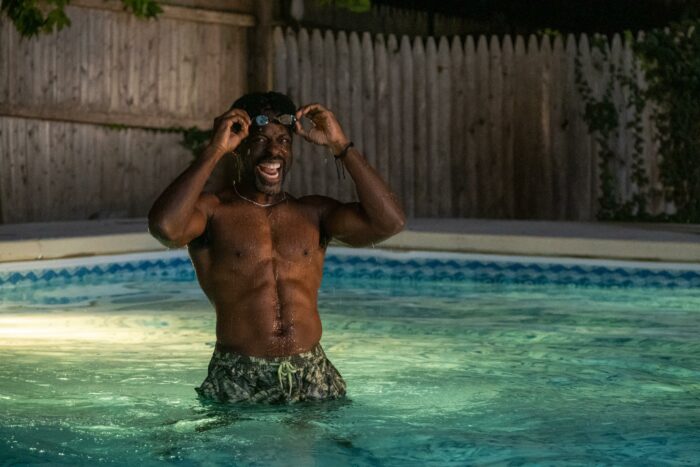
The 96th Academy Awards (2024)
Nominations: 5
Wins: –
I’m really glad I saw American Fiction in theaters. Based on the 2001 novel Erasure by Percival Everett, this is a tricky movie because it openly challenges audiences (especially white audiences) to question their taste. It’s the story of an author choosing to forgo artistic integrity and self-respect in favor of people-pleasing drivel, and how that farce leads him to unbelievable success. So then when I watched it, I couldn’t help but wonder how in on the joke was I? Am I watching a satire or is the real satire that American Fiction is garnering critical praise and award nominations? Thankfully, I saw it with a crowd who were engaged and laughing at the jokes, so I was able to remember the important thing: if I’m having a good time, the rest doesn’t matter.

Dr. Thelonious “Monk” Ellison (Jeffrey Wright) is a brilliant novelist and professor living in Los Angeles who is frustrated with his books’ poor sales and his difficulty connecting with students. He’s given a temporary leave of absence to go home to Boston, where he attends a literary seminar where his own panel is greatly overshadowed by that of Sintara Golden (Issa Rae), the author of new bestseller We’s Lives in Da Ghetto, which Monk brushes off as pandering. Monk reconnects with his sister Lisa (Tracee Ellis Ross), their mother Agnes (Leslie Uggams), and their housekeeper Lorraine (Myra Lucretia Taylor). Lisa is concerned that Agnes is showing signs of Alzheimer’s and is frustrated she’s been left to look after her by herself since Monk and their other brother, Cliff (Sterling K. Brown), have moved out of state. Things only get more complicated from there.
While the family drama unfolds, Monk channels his frustrations into his writing. Unable to even get a publisher for his latest novel because it’s not “black” enough, Monk starts writing a satirical novel out of contempt, deciding to embody all the cliches he thinks publishers want. The final result is called “My Pafology,” which he delivers to his agent Arthur (John Ortiz) under the pen name Stagg R. Leigh. Arthur is hesitant to send out what he perceives as an insult to publishers, but Monk insists upon it. To both their great surprise, “My Pafology” instantly receives the biggest advance of Monk’s career. They decide to see how far this thing can go, so Monk starts pretending to be Stagg R. Leigh, a reclusive convict who is on the run from the FBI after escaping prison. Of course, like all great farces, the more over-the-top it becomes, the more success they attain… but how long can they keep it going?

Written and directed by Cord Jefferson, American Fiction must have been a difficult movie to shoot and edit because it tells two deliberately tonally different narratives. Monk’s relationship with his family is slow, grounded drama about the siblings connecting and dealing with their trauma and the stresses of middle age, growing old, and death. Monk’s experience with publishing “My Pafology” – which is later simply retitled “Fuck” – is much lighter and funnier. I hesitate to go as far as to use the dreaded phrase “tonal whiplash” because this is deliberate juxtaposition, but it does feel like the movie never quite found its groove. I like the two stories American Fiction has to tell, and I can see where they overlap, but as a whole it just doesn’t quite work as well as I would have liked.
Having not read Erasure, I have to wonder how much has changed in adapting the two-decade-old source material. The late-1990s publishing industry was booming (as seen in every romantic comedy of that era) compared to just barely hanging on now and the political correctness movement was a far cry from today’s wokeism. Wikipedia even says that the book’s Monk is inspired to write “My Pafology” in part by the novel Push by Sapphire, which was relevant then but now has become itself an ancient, half-forgotten Oscar darling. One thing I know for sure is new to this adaptation is a deliberately cringey opening scene where Monk clashes with a white student over a slur. Thankfully that scene is the only groaner in a movie full of other scenes that approach the sublime… until the ending which I think also will alienate people and must be a departure from the original text.
In conclusion, I’d like to point out that this was the second movie in a row for me with Adam Brody as the platonic ideal of a white douchebag, and that’s just great.
